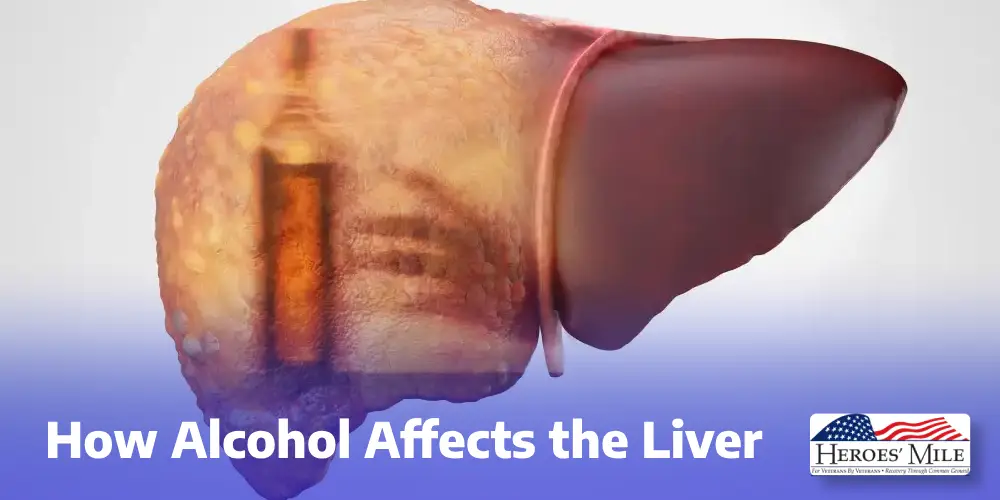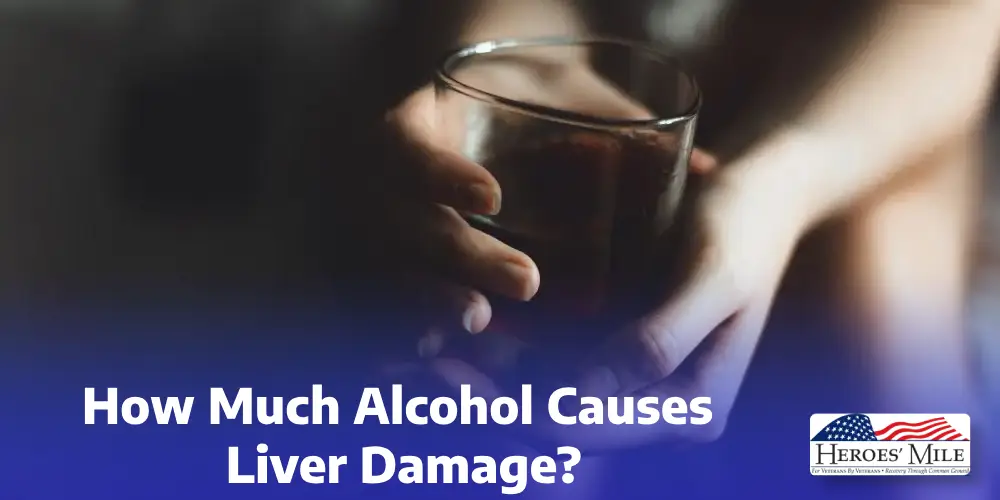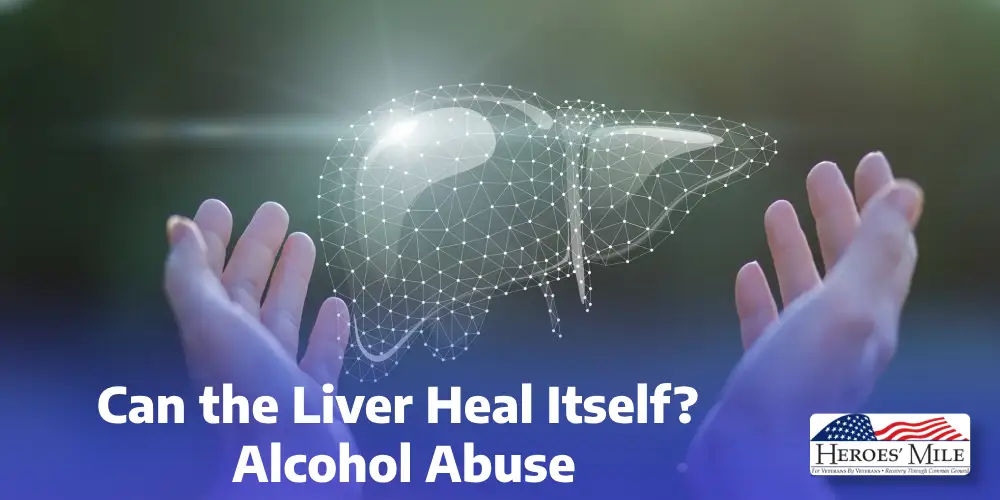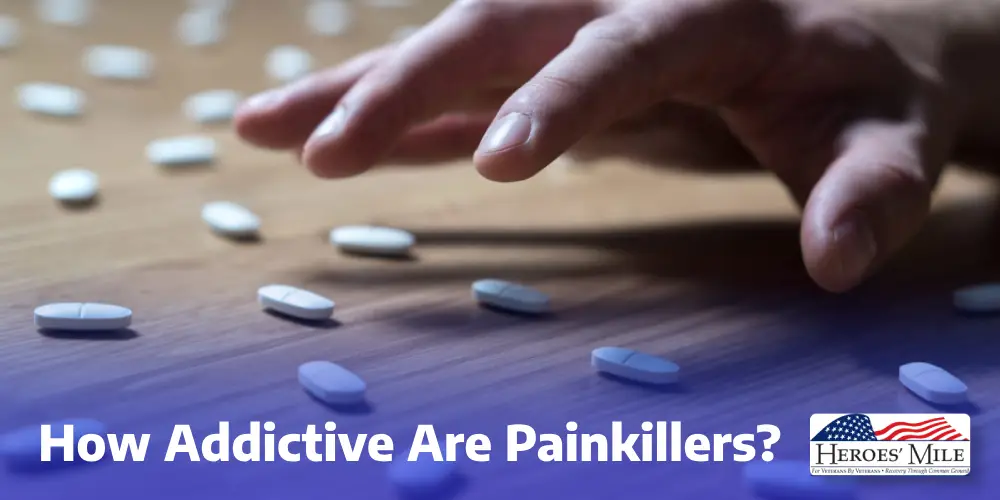Alcohol abuse continues to be a serious problem among people. Reasons for higher substance abuse rates among military personnel often involve stressors, such as combat training and deployment. Many times this stress results in mental conditions such as post-traumatic stress disorder (PTSD), depression, and other mental health conditions that damage mental health.
In response to these issues, many people will self-medicate with alcohol or drugs. And while this makes temporarily offers relief, it exposes individuals to alcohol-related health issues, including liver issues. In fact, health problems related to liver and alcohol use are very common, especially among those who self-medicate with alcohol.
However, the liver is a resilient organ. So it’s fair to ask: Can the liver heal itself after periods of heavy drinking?

How Alcohol Affects the Liver
How Alcohol Affects the Liver
It is the liver’s job to process alcohol, but that takes time. The vast majority of alcohol is processed in the liver at approximately one drink per hour. Therefore, whether an individual is abusing alcohol or engaging in gray area drinking, alcohol use taxes the liver. And the more alcohol you drink, the harder your liver has to work to process it. Over time, if too much alcohol is consumed, you may develop alcohol-related liver damage.
Unfortunately, the timeline and severity of liver disease are difficult to predict and will vary widely between individuals. This makes it difficult to determine if the liver can heal itself from alcohol damage. For example, some heavy drinkers will never encounter alcohol-induced liver problems, while some moderate drinkers will quickly develop alcoholic liver disease.
In addition, it is important to recognize that taking any other substances with alcohol, whether over-the-counter or illegal drugs, can expedite the development of liver diseases (e.g.., acetaminophen).
Stages of Alcoholic Liver Disease
Alcohol-induced liver disease is common, but if caught early, the outlook is optimistic. Unfortunately, symptoms of early liver disease are not easily noticeable.
The stages of liver disease include:
- Alcoholic Fatty Liver Disease (Alcoholic Steatosis)
Fatty liver disease is the most common alcohol-induced liver issue, although the condition can also be non-alcohol-related. As the name suggests, fatty liver is the accumulation of fat in the liver. In most cases, fatty liver alone does not cause problems unless the liver becomes inflamed.
- Alcoholic Hepatitis
Once alcoholic fatty liver disease progresses to liver inflammation, it is called alcoholic hepatitis. This chronic inflammation leads to liver cell death and the formation of scar tissue. Once scar tissue forms on the liver, it becomes more difficult for the liver to function or make repairs. - Alcoholic Cirrhosis
Alcoholic cirrhosis is the most severe form of liver disease. Cirrhosis is irreversible scarring of the liver. At this point, the liver is struggling to function and liver failure is possible.
Alcohol and Liver Disease Fast Facts
- All heavy drinkers are likely to experience fatty liver.
- Women are more likely to suffer alcohol-related liver damage.
- 35% of fatty liver cases progress to alcoholic hepatitis.
- Up to 20% of alcoholic hepatitis cases lead to cirrhosis.
- Early liver damage is reversible, but later stage liver damage (cirrhosis) is not.
How Much Alcohol Causes Liver Damage?

How Much Alcohol Causes Liver Damage?
In short, no amount of alcohol has been deemed safe, and there is no hard limit on how much alcohol it will take to cause liver damage. However, there are some educated guesses.
Light-to-moderate drinking is unlikely to cause lasting liver damage, although it is still possible. Beyond this, the likelihood of developing liver disease from any amount of alcohol will depend on many characteristics such as gender, nutrition, genetics, and race or ethnicity.
Generally speaking, a person consuming more than a moderate intake of alcohol on a daily basis for anywhere between five and 30 years would likely see alcohol-related liver damage. This means more than one drink per day for women (or 14 per week) or more than two drinks a day for men. This wide range of time with fairly vague alcohol limits shows that alcoholic liver disease affects everyone differently, and there is no way of knowing how long it will take to develop symptoms in an individual.
What’s Is a Standard Drink?
One drink is considered 14 grams of alcohol. This breaks down to:
- 12 ounces of regular beer (five percent alcohol)
- five ounces of wine (12% alcohol)
- 1.5 ounces of distilled spirits (40% alcohol)
How to Know if Alcohol Is Affecting Your Liver
The earliest phases of liver disease are unlikely to cause symptoms. For example, an individual could live with fatty liver disease for years before experiencing any symptoms. Because when alcoholic liver disease symptoms do present, they are not always obvious. Early symptoms of liver disease due to alcohol could include:
- Abdominal discomfort, or flank pain and tenderness
- Nausea or vomiting
- Decreased appetite
- Diarrhea
There are more obvious signs of liver disease, but they do not typically appear in the early stages. These symptoms of alcoholic liver diseases include:
- Jaundice (yellow skin or eyes)
- Abdominal fluid
- Swelling of hands and feet
- Itchy skin
- Fever
- Weight loss
- Muscle weakness
- Bruising easily
- Bloody stool
Can the Liver Heal Itself?

Can the Liver Heal Itself? Alcohol Abuse
The good news is that early alcoholic liver disease (alcoholic fatty liver) can be reversed. In order to encourage liver healing, alcohol consumption must stop, and other healthy choices can help, too. This means optimal nutrition, exercise, and minimizing exposure to any substances that damage the liver. For this reason, all supplements or prescription medications should be liver-friendly.
How Long Will It Take Your Liver to Heal?
As with every other component in liver disease, the amount of time needed to heal from early alcoholic liver disease depends on personal characteristics. These often include the length of time that alcohol was used, the amount of alcohol, and the extent of liver damage.
Occasional binge drinking should resolve in days to weeks. On the other hand, chronic alcohol abuse could take years to recover from and may not improve at all unless alcohol use and poor dietary choices are stopped.
Advanced liver disease is not reversible. In these cases, the goal is to slow down the progression of the disease in an effort to extend the functionality of the liver for as long as possible. But that does not mean that it is ever “too late” to quit alcohol. Quitting drinking can minimize the damage done to your liver, even if you’ve already been diagnosed with a serious liver problem. In this way, quitting alcohol can go a long way in preventing further damage to your liver, even if it’s not clear if the liver can heal itself in your case.
When It’s Time to Stop Drinking
If you’ve been drinking alcohol for a long time, it can be hard and even dangerous to stop on your own. Chronic alcohol use can result in both a mental and physical dependency that is difficult to break, especially when considering the additional mental stressors that people experience. If you’re concerned about liver health and finding it hard to quit drinking, alcohol addiction help is available.
Substance Abuse Programs in Florida
At Heroes’ Mile in Deland, Florida, we have several addiction treatment programs that cater specifically to military personnel. These include:
- Drug and Alcohol Detox
- Residential Drug and Alcohol Rehab
- Partial Hospitalization Program
- Intensive Outpatient Program
- During any of our substance abuse programs, it is our job to ensure the safety and comfort of our patients and to provide them with the tools needed to prepare for life in recovery.
About Heroes’ Mile in Deland, Florida
Heroes’ Mile is a substance abuse treatment center designed for people experiencing problems with addiction and other psychological challenges related to their military service. Located in central Florida, our rehab helps treat common issues faced by people.
Video
What does the liver do? – TED Talk
There’s a factory inside you that weighs about 1.4 kilograms and runs for 24 hours a day. It’s your liver: the heaviest organ in your body, which simultaneously acts as a storehouse, a manufacturing hub, and a processing plant. Emma Bryce gives a crash course on the liver and how it helps keep us alive.
News Audio
Sharp, Off The Charts Rise In Alcoholic Liver Disease Among Young Women – NPR
For many years, Jessica Duenas led what she calls a double life. She was the first in her immigrant family to go to college. In 2019, she won Kentucky’s Teacher of the Year award. That same year, Duenas typically downed nearly a liter of liquor every night.
By the time she was 34, she was diagnosed with alcoholic hepatitis, a serious inflammation of her liver that doctors warned could could soon lead to irreversible scarring and even death if she didn’t didn’t stop drinking, and quickly.
FAQ
- How does alcohol affect the liver over time?
Alcohol can cause liver inflammation, fatty liver disease, cirrhosis, and other serious conditions if consumed excessively over long periods. - Can the liver heal itself after stopping alcohol use?
Yes, the liver has the ability to regenerate, but recovery depends on factors like the severity of damage, overall health, and how long alcohol was abused. - What are the first signs of liver damage from alcohol?
Early symptoms include fatigue, nausea, loss of appetite, and abdominal discomfort. More severe signs include jaundice (yellowing of the skin), swelling, and confusion. - What steps can help liver recovery after alcohol abuse?
Stopping alcohol consumption, eating a nutritious diet, staying hydrated, exercising, and consulting a healthcare provider for medical support can aid recovery. - When should someone seek treatment for alcohol-related liver damage?
If experiencing symptoms like jaundice, extreme fatigue, swelling, or confusion, seeking immediate medical attention is crucial. A behavioral hospital can also provide support for alcohol addiction treatment.



